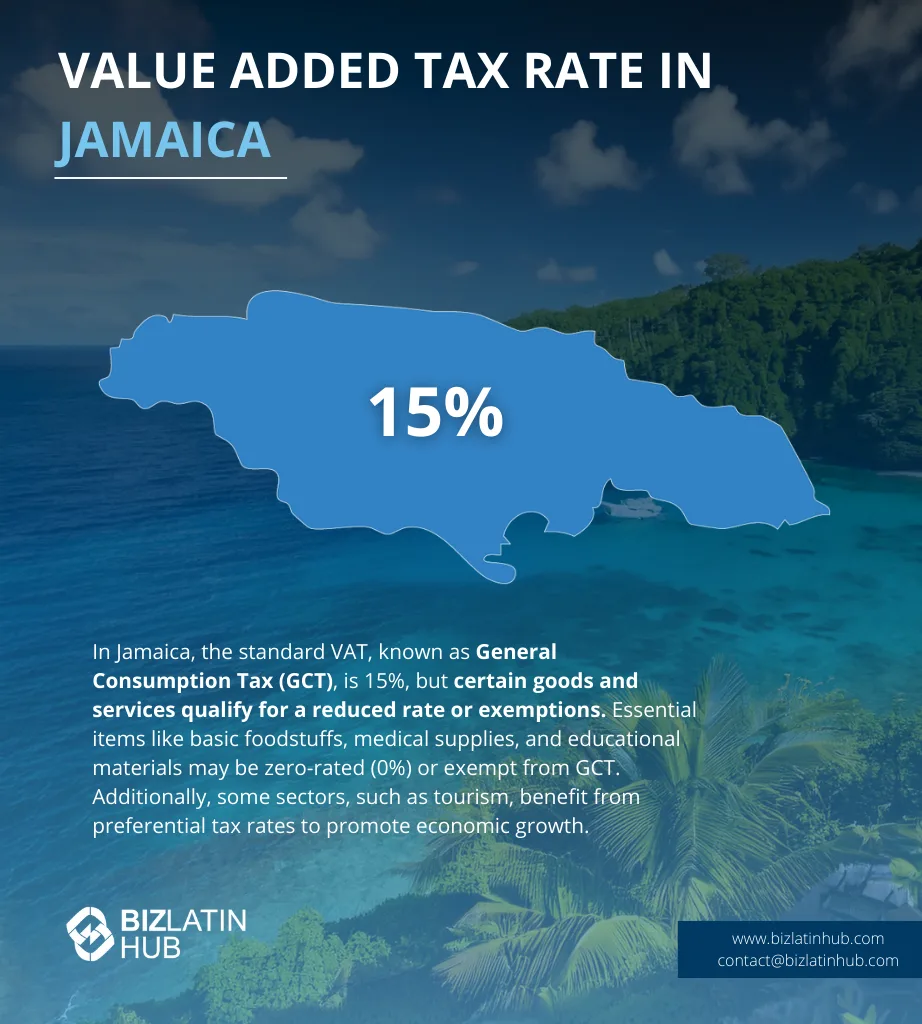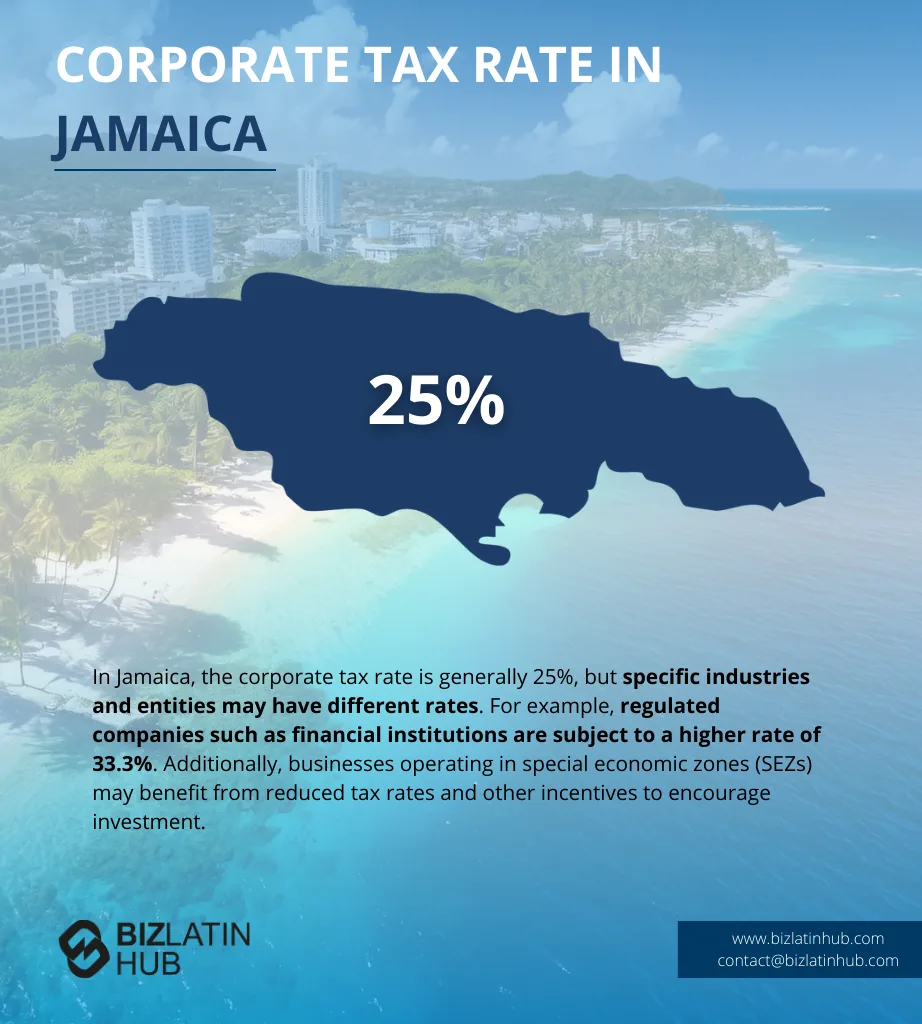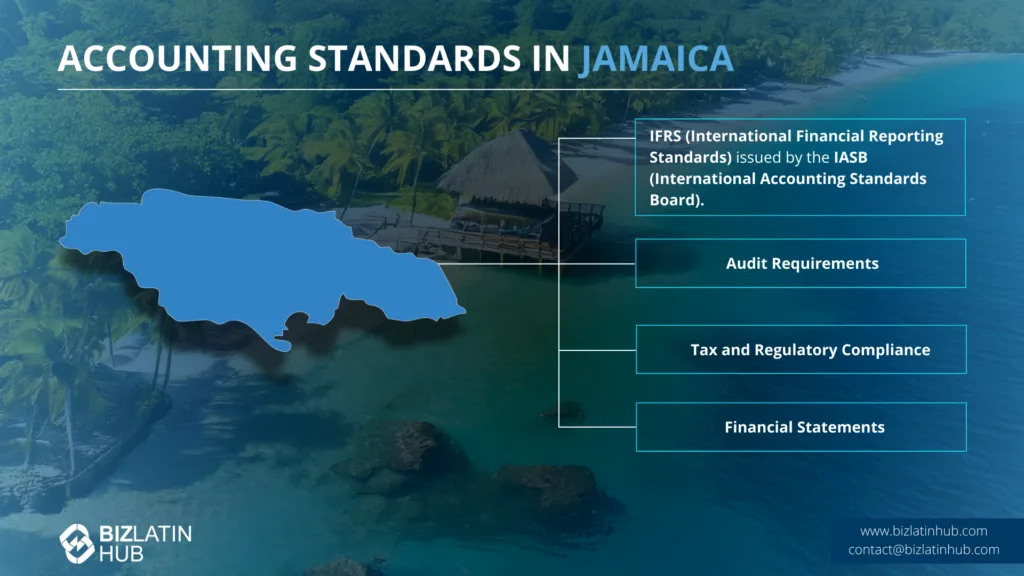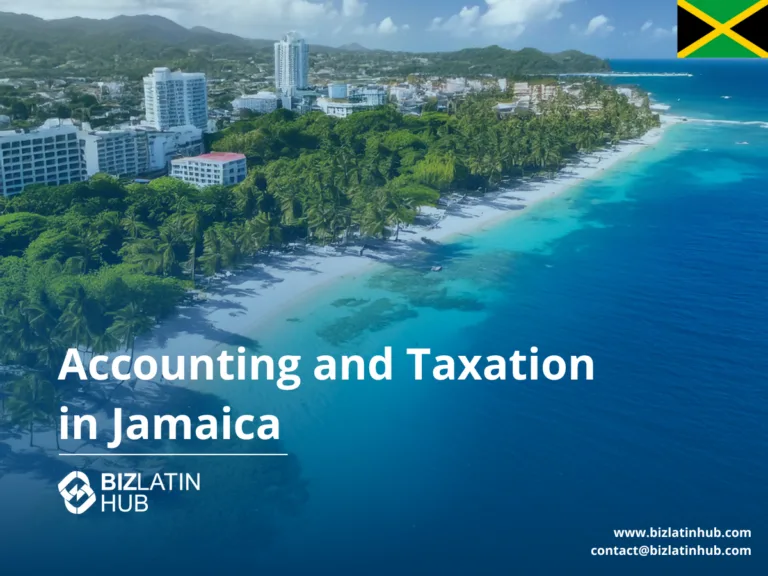The growing market for foreign investors looking at company formation in Jamaica is fueled by its strategic location, stable political environment, and well-established tourism industry. The government’s proactive measures to improve infrastructure and streamline business processes have contributed to the country’s attractiveness for international investments. However, tax and accounting requirements in Jamaica can be hard to understand at first. This guide details the specific fiscal obligations overseen by Tax Administration Jamaica (TAJ), including the distinct rates for regulated vs. unregulated companies.
| Key Takeaways: Corporate Tax and Accounting in Jamaica |
| What Are The Accounting Standards in Jamaica? | The Institute of Chartered Accountants of Jamaica (ICAJ) holds the authority granted by the Public Accountancy Act as the standard-setter in the jurisdiction. ICAJ has officially embraced and implemented IFRS and IFRS for SMEs as the prevailing accounting standards. |
| What is the standard corporate income tax rate in Jamaica? | Regulated companies governed by entities such as the Bank of Jamaica or the Financial Services Commission, face a 33% CIT rate, with some exceptions |
| Jamaican Value Added Tax Rate | The General Consumption Tax (GCT) is a value-added tax set at 15%. |
| What is The Dividend Tax Rate in Jamaica? | Resident corporations pay a 15% tax rate while non-residents pay a rate of 33%. |
| What are the deadlines for reporting? | Companies must file an annual income tax return by March 15th. Annual returns must be filed with the Companies Office (COJ). Employers must file a monthly S01 form for payroll. |
| Who are the main regulatory bodies for tax and accounting? | Compliance in Jamaica is overseen by several key bodies. Tax Administration Jamaica (TAJ) is responsible for collecting all taxes, including income tax and GCT. Financial reporting standards are overseen by the Institute of Chartered Accountants of Jamaica (ICAJ). |
Jamaica’s Key Tax Requirements for Companies
Understanding the tax and accounting requirements in Jamaica is pivotal when starting a business in this market. Here are the tax rates you need to know.
1. Corporate Income Tax
The standard corporate income tax rate is 25% on net profits. For certain regulated companies, such as those in the financial services sector, the rate is 33.3%. The current corporate income tax (CIT) rates are as follows: Regulated companies governed by entities such as the Bank of Jamaica or the Financial Services Commission, face a 33% CIT rate.
Building societies are taxed at 30%, life assurance companies at 25%, and unregulated companies operating within Jamaica at 25%. Specific organizations, such as pension funds and approved charitable organizations, are exempt from income tax as per the approval of the Commissioner General, Tax Administration Jamaica (TAJ).

2. General Consumption Tax (GCT)
This is a 15% value-added tax. Registered companies must charge GCT on their sales and can claim credits for GCT paid on business expenses. GCT returns must be filed on a monthly basis.
The standard GCT rate is 15%, but specific goods and services may have different rates. Telephone services and handsets face a 25% GCT, while hotels and tourism-related businesses pay an effective rate of around 10%.
3. Statutory Payroll Contributions
Employers are responsible for deducting and remitting contributions for NIS, NHT, HEART, and Education Tax from their employees’ salaries. The employer also pays their own portion for each of these contributions.
Expert Tip: The S01 Form Complexity
From our experience, payroll compliance in Jamaica is complex due to the number of different statutory deductions (NIS, NHT, Education Tax, HEART). These are all consolidated into a single monthly filing called the S01 Form. Errors on this form are common and trigger penalties.
We advise clients to use local payroll software that automatically calculates these four distinct contributions and generates the S01 form, rather than attempting manual calculations.
Other Key Tax Rates in Jamaica
Income Tax: After considering any applicable tax-free allowances, Most people pay a 25% rate on their earnings, up to 6 million Jamaican dollars per year. If their income exceeds 6 million Jamaican dollars annually, the tax rate increases to 30%.
Asset Tax: A 0.125% asset tax is applied to the ‘taxable value’ of assets belonging to deposit-taking institutions regulated by the Bank of Jamaica, as well as securities dealers, life assurance companies, and property and casualty insurance companies regulated by the Financial Services Commission.
Withholding Tax: Resident corporations pay a 15% tax rate while non-residents pay a rate of 33%.
Property Tax: In Jamaica, Property tax is assessed based on different value bands, with rates varying from 0.50% to 0.90%.

What are the tax rules in Jamaica?
A corporation residing in Jamaica is taxed on its income worldwide, while non-resident companies are taxed only on income generated within Jamaica. Tax, at a rate of 33%, is applied to specific income sources like interest, dividends, royalties, and fees for non-resident corporations. However, if the recipient resides in a country with a double taxation treaty (DTT) with Jamaica, lower withholding rates may apply.
Main Regulatory Bodies
Compliance in Jamaica is overseen by several key bodies. Tax Administration Jamaica (TAJ) is responsible for collecting all taxes, including income tax and GCT. The National Housing Trust (NHT), National Insurance Scheme (NIS), and the HEART Trust/NTA manage statutory payroll contributions. Financial reporting standards are overseen by the Institute of Chartered Accountants of Jamaica (ICAJ).
Tax Administration Jamaica (TAJ)
Tax Administration Jamaica (TAJ) is the country’s revenue authority. Companies must have a Taxpayer Registration Number (TRN) and utilize the “Revenue Administration Information System” (RAIS) for online filings.
Jamaica’s international tax treaties
Jamaica maintains a Bilateral Investment Treaty with the United States and has signed various double taxation agreements with countries such as Canada, China, France, Germany, and the United Kingdom. While not having a Free Trade Agreement (FTA) with the United States, CARICOM inked a Trade and Investment Framework (TIFA) in 2013.
In 2014, Jamaica and the United States signed an inter-government agreement for reciprocal information sharing under the U.S. Foreign Account Tax Compliance Act (FATCA).

FAQ regarding tax and accounting requirements in Jamaica
Using our experience, we’ve identified common questions our clients often ask us about accounting and taxes in Jamaica.
Depending on the type of business, the corporate tax rate ranges from 33 to 25%.
A resident corporation is taxable on its worldwide income. Non-resident companies are subject to tax on Jamaican-sourced income.
Tax Administration Jamaica (TAJ) is the name of the revenue authority in Jamaica.
The Institute of Chartered Accountants of Jamaica (ICAJ) holds the authority granted by the Public Accountancy Act as the standard-setter in the jurisdiction. ICAJ has officially embraced and implemented IFRS and IFRS for SMEs as the prevailing accounting standards.
In Jamaica, the ACCA (Association of Chartered Certified Accountants) is widely considered the primary professional qualification for local accountants. Nevertheless, individuals with the CPA (Certified Public Accountant qualification) from the United States of America continue to enjoy high esteem among employers.
Jamaica does not place restrictions on foreign ownership or control, and local laws treat investors, whether local or foreign, without distinction.
GCT is a value-added tax applied to the supply of most goods and services in Jamaica. The standard rate is 15%. Businesses with annual revenue over JMD $10 million must register for GCT.
The annual corporate income tax return must be filed with Tax Administration Jamaica (TAJ) by March 15th each year. Companies are also required to make quarterly estimated tax payments throughout the year.
The four mandatory contributions are the National Insurance Scheme (NIS) for social security, the National Housing Trust (NHT) for housing benefits, the HEART Trust/NTA for workforce training, and the Education Tax. Both employees and employers contribute.
Yes, the Jamaican Companies Act requires all companies to have their annual financial statements audited by a registered public accountant. These audited statements form the basis of the annual income tax return.
It is an annual tax payable by all companies based on the value of their assets. The specific amount is fixed by tiers.
Biz Latin Hub can help you with tax and accounting requirements in Jamaica
At Biz Latin Hub, we provide an extensive range of market entry and back-office solutions in Latin America and the Caribbean.
Our team has expertise in tax and accounting requirements in Jamaica, with legal services, accounting and taxation, hiring, and visa processing available.
We have strong connections in the LATAM region through solid partnerships. This wide network gives us many resources to help with global projects and explore new markets in different countries.
Contact us today to learn more about our services and how we can help you achieve your business goals in Latin America and the Caribbean.
If this article about tax and accounting requirements in Jamaica interests you, check out the rest of our coverage of the region. Or read about our team and expert authors.






